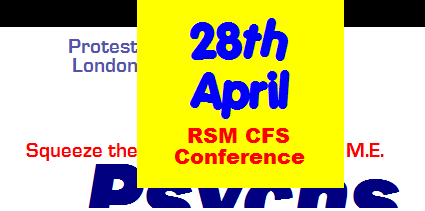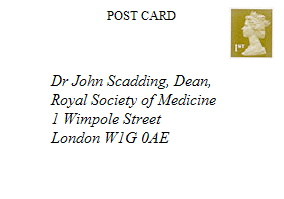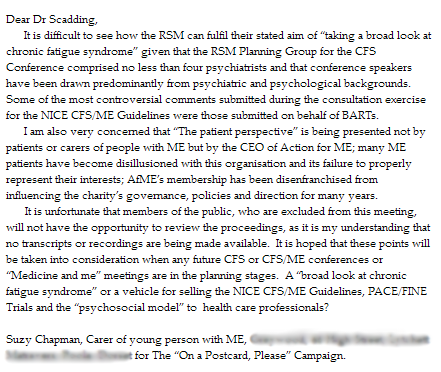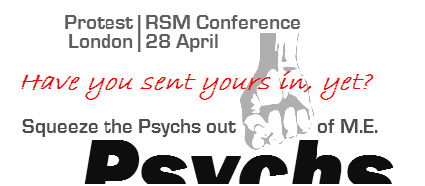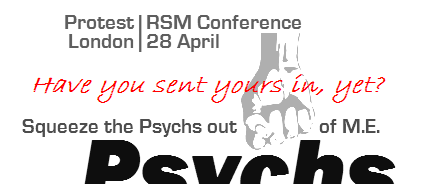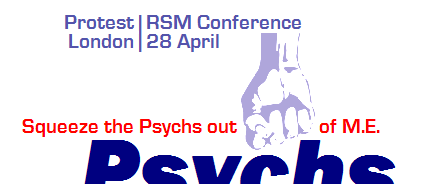From Suzy Chapman & Ciaran Farrell
19 April 2008
Can AfME claim a mandate to represent “The patient perspective”?
This week, Third Sector website highlights interesting figures from AfME’s (Action for ME) 2006/2007 year end accounts:
The numbers: Action For ME
By Patrick McCurry, Third Sector, 16 April 2008
“Action for ME works to improve the lives of people with chronic fatigue syndrome, or myalgic encephalopathy. Total income – £693,000 for the year ending 31 March 2007, compared with £956,000 for the previous 12 months. Highest salary – The interim chief executive was paid £55,000. Reserves policy – The charity seeks to hold free reserves equivalent to at least three times its monthly running costs…”
You’ll need to register here with Third Sector site to read the rest of this item.
[Note: “Interim chief executive” refers to Ms Trish Taylor, formerly Vice-chair for governance, who took on the position of Acting Chief Executive in the wake of Chris Clark’s resignation and prior to Sir Peter Spencer taking up his position as the new CEO of AfME. According to the job specification, the vacancy for a CEO attracted a salary in the region of 70K – not a bad remuneration for someone who has told us that he felt it was time to give something back to society.]
Download a copy of AfME’s 2006/2007 Report and Accounts, as filed at Companies House, here
Download a copy of AfME’s 2006/07 Annual Review here
On Monday, 28 April, Sir Peter Spencer will be addressing the Royal Society of Medicine’s “CFS” Conference – at 2.00pm Sir Peter will be representing “The patient perspective”.
Professor Anthony Pinching, Principal Medical Adviser to AfME, is acting as one of the session chairs for this meeting; other sessions are to be chaired by Professor Mansel Aylward (Director, Unum Centre for Psychosocial and Disability Research, Cardiff University), Professor Kam Bhui (Department of Psychiatry, Queen Mary School of Medicine and Dentistry) and Dr John Scadding, Dean of the RSM and chair of the CFS Conference Planning Group.
If you don’t already have a copy of the RSM’s “CFS” Conference Programme you can download a PDF here: http://rsmcfsprogramme.notlong.com
It is of considerable concern to many of us within the ME community that “The patient perspective” is not being given by ME patients or carers, themselves, but by the Chief Executive of what many of us consider to be an undemocratically run organisation, and that this has been the case for many years.
While Sir Peter is enjoying his lunch in the RSM’s dining rooms and honing his address for the conference, will he consider this perspective?
That AfME claims – in breach of its own governing document, its Memorandum & Articles of Association – that its members are merely passive “subscribers” to its magazine rather than members of the company and charity, Action for ME;
That AfME has not held a public AGM to which the membership of AfME has been invited to attend for many years;
That AfME’s trustees are not elected though free, fair and democratic trustee election processes;
That as a result, AfME’s members have for many years been denied the voting rights to which they are entitled under Charity and Company Law;
[ For detailed analysis of AfME’s modus operandi see the ONE CLICK AfME Dossier ]
That AfME operates within a culture of secrecy and that a good example of this is their handling of the joint AfME/MRC “Research Summit”, held in November 2006;
That AfME were unwilling to disclose to enquirers, including their own members, the names of those who would be taking part in this already contentious event, which had previously been postponed due to public disquiet over the psychiatric/psychological bias of the participants, forcing enquirers to apply to the MRC under the Freedom of Information Act in order to obtain this information;
That in October 2006, the month before the AfME/MRC Research Summit was due to take place, AfME sent out letters to its members and lapsed members asking for donations in support of pilot studies for “biomedical research into M.E.” but failed to mention that the Research Summit, out of which these studies might be developed, was a joint venture between itself and the MRC and failed to mention that many of those who would be participating in this event were from psychiatric/psychological backgrounds.
Read the brouhaha surrounding this Research Summit and view the list of those who participated in it, here, on ME agenda site:
The AfME Research Summit and the list they did not want us to see
That the list of names of those who attended the AfME/MRC Research Summit is not the only information which ME charity AfME has been unwilling to disclose.
The AfME National ME Observatory project has been awarded £500,000 in funding from The Big Lottery Fund for six epidemiological research studies:
That to date, AfME has failed to place in the public domain a list of all members of the Project Steering Group and the Project Management Group and has published only a list of the lay members of the Steering Group and named the twenty odd individuals who comprise the Project’s Reference Group and then, only in its magazine;
That to date, Dr Derek Pheby, ME Observatory Project Co-ordinator and AfME have refused requests to identify those who comprise the ME Observatory Steering Group and the Management Group or who are otherwise involved in this Project, together with the organisations they represent (where appropriate), and their functions within the Project Group or within the Project as a whole;
That to date, Dr Derek Pheby, ME Observatory Project Co-ordinator and AfME have refused to disclose by what process seats within the Steering and Management Groups were allocated. The Project Co-ordinator has confirmed to me only that Dr Charles Shepherd holds a seat on the Steering Group;
That it is not possible, therefore, for stakeholders like myself, or for the general public to establish with whom specific questions, queries or concerns about this Project or the management of this Project should be raised, nor by whom and on what basis their questions will be addressed, since no lines of management accountability have been set out for public use, and therefore scrutiny since the functions of those comprising the Steering and Management Groups have not been defined, since the organisations they represent have not been declared and since the process through which they were appointed to these Groups remains unknown.
That even members of what rapidly became a tokenistic Reference Group set up for the Observatory Project in order the advise the Steering Group have been denied this basic information;
That “CFS/ME” is to be diagnosed for epidemiological purposes for these National ME Observatory Projects using patient survey forms which employ the term “the tiredness symptom” and that ask study participants or prospective study participants whether they had been “happy” at school and whether they had been “active” six months before the onset of their illness.
That the National ME Observatory Steering and Management Groups are responsible for overseeing the spending of half a million pounds of public money and are accountable to the public for the manner in which that money is spent and are expected to be open to public scrutiny;
That in AfME’s 2006 Research Summit Report there was reference to a “Research Advisory Panel” – are members of AfME, the wider ME community and the general public going to meet a similar lack of transparency from AfME when trying to establish who will comprise this “Research Advisory Panel”?
That Professor Stephen Holgate, Professor of clinical pharmacology at Southampton University has just been named as chair of “a new multi-disciplinary panel set up by the Medical Research Council which is to focus on the subtypes and aetiology of ME/CFS as part of a plan to fertilise cross-disciplinary research activity in this field.”
In what ways and on what basis might AfME have an involvement in the multi-disciplinary body that the MRC is in the process of setting up, which was one of the recommendations that came out of the AfME/MRC Summit?
Will this information also have to be applied for under FOI?
Last November, Ondine Upton, representing this organisation as a trustee in the week long “You and Yours” ME strand declaimed that she and her fellow trustees are representative of, and act in the interests of people with ME. It is unacceptable that a membership charity like Action for ME that purports to “be run by and for people with ME” makes such claims when Action for ME is not prepared to be open, honest and transparent with its members.
Sir Peter is the unelected employee of an unrepresentative, undemocratic and unelected board of trustees; he does not suffer from ME, himself, and neither is he a carer of anyone with ME. Perhaps Sir Peter would care to reflect on his personal and organisational credentials, or lack thereof, as he takes a final look through his notes before giving his presentation to the RSM Conference, on 28 April.
Suzy Chapman
me.agenda@virgin.net
https://readmeukevents.wordpress.com
Ciaran Farrell
ciaran@jfarrell58.freeserve.co.uk
Back to Home page



